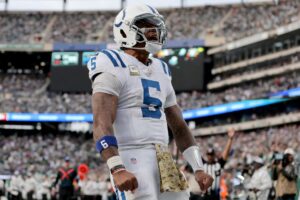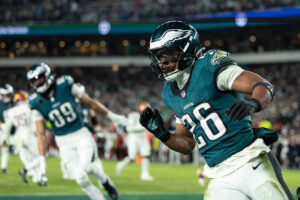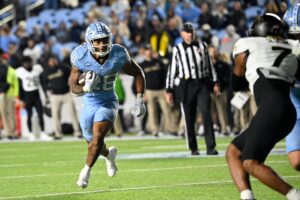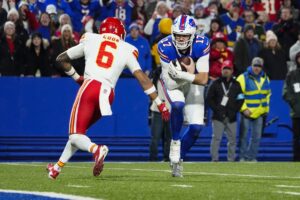The 100th season of NFL football is just a few months away. With that in mind, it’s a fitting time to explore and celebrate the league’s history and its emergence as America’s most popular pro sports league. There are certainly numerous events over the past century, both well-known and obscure, that are deserving of attention from a historical standpoint.
That’s especially true of the many great teams who went on to win championships. Many of them were part of dynasties, the most recent of which is the current run the New England Patriots are on. But they certainly weren’t the first to go on a run of multiple titles over a relatively short time span.
The Green Bay Packers, who joined the NFL in its second year of existence (1921), are arguably the first as they won three straight titles between 1929 and 1931. Then came the Chicago Bears of the 1940s. That decade saw them win four titles, more than any other NFL team. And the win which spawned that run of success stands out perhaps more than any other in NFL history.
The Chicago Bears 1940 NFL Title: A Rout for the History Books
Blowout wins of epic proportions are certainly in the news given the United States’ 13-0 thrashing of Thailand at this year’s Women’s World Cup. It goes down as, by far, the most lopsided result in the history of either the men’s or women’s iteration of the tournament. The closest thing the NFL has to such a rout is what the Bears did to the Washington Redskins in the NFL title game nearly 79 years ago.
The final score is almost hard to believe considering the game was against the two best teams in the league. Chicago 73, Washington 0. It remains to this day the largest margin of victory in league history. The closest any team’s come to such a one-sided shutout win since was the Patriots who beat the Tennessee Titans 59-0 on October 18, 2009. Ironically enough, the Redskins are the only other NFL team to have scored 70+ points in a game when they beat the New York Giants 72-41 in 1966.
There are a few other factors that make such a final scoreline unfathomable. The Redskins actually beat the Bears 7-3 in their lone meeting of the regular season on November 17. They also finished with a better final record at 9-2 compared to the Bears who went 8-3. Both won their respective divisions which meant that they’d engage in a rematch with the league title on the line.
Bad Blood
There have been quite a few iconic head coach/quarterback duos over the first century of the NFL. Obviously, Bill Belichick and Tom Brady is the most recent example. But in the 1940s, it was beloved Bears patriarch George Halas whose initials can be found on the left sleeve of the team’s jerseys to this day and Hall of Fame quarterback Sid Luckman. Halas brought cutting edge innovation to NFL offenses with the implementation of the T formation.
After a 14-7 win over the Packers on November 3, the Bears stood at 6-1. But then they underwent a bit of adversity, losing their next two. It included the defeat to the Redskins which came in somewhat controversial fashion. The final play of the game saw Luckman attempt a pass in the end zone intended for fullback Bill Osmanski. It fell incomplete but there was a lot of contact and yet no pass interference call which infuriated Halas.
After the game, Redskins owner George Preston Marshall reveled in his team’s victory and derided the Bears for complaining about the no-call. “The Bears are a bunch of crybabies,” he told reporters. “The Bears are quitters.” When it became clear a rematch was imminent in the NFL title game that year, the Washington, D.C. media had a field day with this narrative. One of the titles of a newspaper article in the leadup to the game was “Gutless Bears Hit Capitol.”
Old School Bulletin Board Material
In today’s day and age, there are myriad forms of media that can serve as a conduit for motivating players to “disprove the haters.” There’s everything from fans engaging in troll warfare on Twitter to Colin Cowherd or Skip Bayless predicting failure on FS1. But back in 1940, the newspaper was pretty much the only place where pro athletes could find themselves on the receiving end of harsh criticism. It was the sportswriters of the day who were the gatekeepers when it came to crafting narratives regarding what transpired on the field.
This fact wasn’t taken lightly by Halas. Before the rematch which took place at Griffith Stadium in D.C. since the Redskins had a better regular season record, he posted clippings in the locker room from all the articles that were lambasting them for complaining about being robbed when the teams last met. Later in his life, Luckman recounted how Halas admonished his team to use it as motivation to make a statement.
“Gentleman, this is what Mr. Marshall thinks of you,” he exclaimed. “I know you are the greatest football team in America. I know it and you know it. I want you to prove that to Mr. Marshall, the Redskins, and, above all, the nation.”
Luckman also noted that the team was so fired up that they broke down the locker room doors on their way to the field for kickoff.
A Game Played During an Ominous Time
The world of December 8, 1940, the date of the NFL title game that year, was one fraught with uncertainty. Though Nazi Germany had just suffered its first major military defeat in the Battle of Britain, it was still in full control of most of continental Europe. The Japanese attack on Pearl Harbor, which brought the US into World War II, was one day short of a year away. Luckman would later go on to serve in the Armed Forces and is one of 12 World War II veterans currently in the Pro Football Hall of Fame.
There were hints that big things were in store for the Bears that day when Osmanski opened the scoring with an explosive 68-yard touchdown scamper. They added two more rushing touchdowns in the first quarter from Luckman and Joe Maniaci. But the only other score of the first half was a 30-yard touchdown pass Luckman threw to Ken Kavanaugh. Though Chicago was firmly in control, a historic blowout didn’t seem to be on the horizon.
Then the third quarter happened. You could make the argument that it was the worst 15 minutes of football in Redskins franchise history. The Bears took three interceptions the other way for touchdowns during that span. As of now, only 11 other teams in NFL history have registered three or more pick-sixes in a game. All in all, Frank Filchock, Sammy Baugh, and Roy Zimmerman combined for eight interceptions on the day. It’s a dubious feat that only seven other NFL teams have pulled off with its last occurrence coming in 1973.
After taking a 54-0 lead into the final stanza, the Bears continued to pile it on. And suddenly, another problem emerged. They were in danger of running out of footballs. Back then, they didn’t have nets behind the goalposts to prevent the ball from going into the crowd. The steady stream of touchdowns and extra points gave a few lucky fans a souvenir that they were reluctant to part with even when offered money by officials to do so. So after the Bears second score of the quarter which put them up 66-0, they were forced to either run or pass for the extra point. Backup quarterback Solly Sherman completed a pass to Maniaci on the first attempt. But the second one was unsuccessful after a one-yard rushing touchdown by Harry Clarke capped off the scoring for the day.
Sure enough, after the game, many Bears players were quick to mock Marshall for his “crybabies” reference. One even shouted during the celebrations in the locker room: “Who are the crybabies now?”
Last Word
Let’s face it. Such a one-sided result is essentially impossible in today’s NFL. The league is as competitive as ever and there really isn’t that much of a difference between the best and worst team. Sure, there have been plenty of blowouts in subsequent editions of the NFL title game, even during the Super Bowl era. But none have ever approached the level of carnage that the Bears wrought on that December day all those years ago. And it’s all but certain that, in the future, none ever will. Indeed, 73-0 will likely stand for all time as the most one-sided championship game result in the history of North American pro sports.






